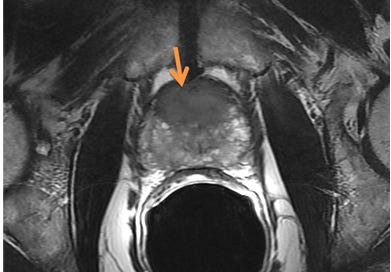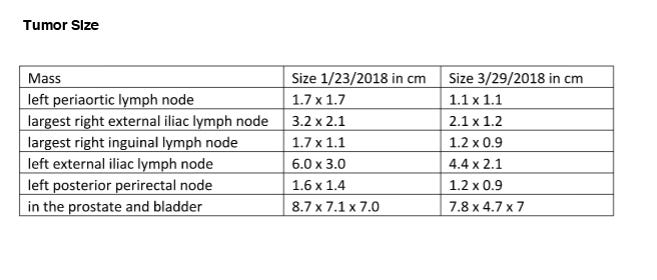Case Report: Metastatic Prostatic Adenocarcinoma, age 77, Male
Dosage, Protocol, Maintenance (Prevention)
Fenbendazole Can Cure Cancer presents Case Reports of people who have treated their own cancers along with other articles to help understand how fenbendazole works. Previous articles covering other cancers are in the Archives link.
According to the CDC, “aside from non-melanoma skin cancer, prostate cancer is the most common cancer among men in the United States. It is also one of the leading causes of cancer death among men”. The following Case Report details the experiences of a reader who guided his father through his battle with prostate cancer and the thought processes that helped direct the decisions incorporating fenbendazole into that treatment. The first section is a self-report summary of the Case Report (italics) followed by the more complete Case Report.
My father was diagnosed with stage 4 prostate cancer in Dec 2017. He started hormone therapy in Feb 2018, Lupron to halt testosterone production. I read Joe Tippens story. Did some more research and showed his NYC Memorial Sloan Kettering oncologist the research paper on how fenben works to disrupt cancer https://pubmed.ncbi.nlm.nih.gov/30093705/ . His response, "this is not standard of care". He did radiation for about 4 weeks in March 2019. My dad agreed to start fenbendazole using Joe Tippens original protocol (panacur 1g 3 times a week, daily vit e, curcumin, cbd oil) June 2019. By the end of 2018 his cancer marker, PSA had gone from 129 at original diagnosis to 7, normal PSA is 0-1. Currently, PSA is less than 1. I believe fenbendazole made all the difference. His doctors don't know he's doing this protocol. 5 year survival rate for stage 4 prostate cancer is 30%. My father works out everyday, doesn't get sick and enjoying time with his family and grandkids. Unfortunately, he got 2 covid shots and 2 boosters so I worry and keep an eye out for Turbo cancer.
In November 2017, my father underwent an ultrasound of his abdomen after he complained to his primary care physician that he was having trouble urinating. The ultrasound found an echogenic structure in his left kidney which could be angiomyolipoma.
A follow up CT scan was performed January 2018 which found masses in the left periaortic lymph node, largest right external iliac lymph node, largest right inguinal lymph node, left external iliac lymph node and left posterior perirectal node. A mass was also seen in the prostate and bladder.
A biopsy was performed on the left pelvic lymph node following the CT scan. The final diagnosis was Metastatic Prostatic Adenocarcinoma. The 5 year survival rate for this type of stage 4 prostate cancer is 30%.
After consulting with his oncologist, my father began Lupron injections in February 2018 to stop the production of testosterone. Lupron would be administered every 3 months. Lupron is a hormone therapy treatment which decreases the production of testosterone in the testicles. Lupron has been shown to be effective in treating prostate cancer for 18-24 months after which point the cancer typically becomes resistant to this drug, otherwise known as castration-resistant cancer. In July 2018, my father then began taking Zytiga (abiraterone) and Prednisone. Zytiga is used to decrease the production of testosterone in the adrenal glands. Zytiga has been shown to be effective in treating prostate cancer for 8-24 months at which point the cancer typically becomes resistant to this drug, otherwise known as castration-resistant cancer.
Once these 2 drugs’ effectiveness has been exhausted the patient is typically recommended to undergo chemotherapy and then onto palliative end of life care.
Given this information my expectation based on my own research, was that my father would be able to effectively fight his cancer for 2 to 4 years from his diagnosis date in late 2017, then try toxic chemotherapy for a few months, then move onto hospice care at home. I asked his oncologist to confirm my research on Lupron and Zytiga were in the ballpark for how much time my father had to live and he said that my research was in line with his expectations for my father.
I continued my own research into treatments for prostate cancer and came upon Joe Tippens’ site mycancerstory.rocks. This led me to finding the NIH paper showing Fenbendazole acting as a agent for microtubule destabilization and cancer cell death https://pubmed.ncbi.nlm.nih.gov/30093705/
In February 2019 we were able to get a consultation with oncologists at Memorial Sloan Kettering (MSK) who recommended radiation therapy for my father. They suggested using Image-Guided, Intensity-Modulated Radiation Therapy. In one of the visits with my father’s oncologist at MSK, I brought along a copy of the NIH paper on Fenbendazole and asked him to read it. He looked at the paper but didn’t take it and said that it was interesting research but not standard of care and so could not be considered in the treatment plan for my father.
From March to May 2019, my father received 26 radiation treatments at MSK. In June 2019 my father began the Joe Tippens protocol (3 days of fenbendazole (Panacur-C 222mg) followed by four days off each week, with daily vitamin E, CBD oil, curcumin).
The tables below show my father’s progression of PSA levels and tumor size from his diagnosis date. PSA or prostate specific antigen is a marker used to estimate the likelihood of prostate cancer. A PSA level above 10 indicates a greater than 50% chance of having prostate cancer. A PSA level less than 4 is considered normal.
My father’s cancer responded positively to Lupron and Zytiga with corresponding lowering of PSA levels and tumor sizes. My research on alternative and supplemental methods of treating my father’s advanced prostate cancer was prompted by the confirmation from his first oncologist that my father was likely to only live for about 2 to 4 years from his initial diagnosis. When I stumbled upon Joe Tippens’ story I thought “what the heck there didn’t seem to be any side effects to Joe for using his fenbendazole protocol and it was worth trying for my father”. Fortunately, my father was open to trying alternative therapies to treat his cancer.
It’s difficult to attribute all the success of treating my father’s cancer to fenbendazole as the conventional hormone and radiation treatments did seem to reduce my father’s PSA levels and size of his tumors. But I do believe my father’s continued use of Joe Tippens’ fenbendazole protocol has kept his cancer in remission after the likely effectiveness of Lupron and Zytiga have worn off.
— D.Y., NYC, November 30, 2022
Q: Did your father experience any side effects from the fenbendazole?
A: No. My father works out every day, doesn’t get sick and is enjoying time with his family and grand kids.
Q: Did the oncologists know that your father was using fenbendazole?
A: No. I tried to bring it up with the paper I mentioned but they weren’t interested.
Q: Did your father get any of the covid vaccinations?
A: Unfortunately he got two covid shots and two boosters, so I worry and keep an eye out for turboCancer.
Q: There are a lot of moving parts in your father’s treatment, what role do you think fenbendazole had in his recovery?
A: I think fenbendazole made all the difference because the traditional treatments for his cancer only result in a 30% survival rate for Stage 4 prostate cancer. He’s beating the odds.
This Case Report illustrates a number of concepts that are developing regarding when and how to use fenbendazole. First, that the decision to use fenbendazole is wise no matter when it’s made in the course of treatment. In this Case Report, traditional treatment was started and did reduce the size of the tumors and of the PSA blood tumor marker measure. Fenbendazole, as a low risk/high reward treatment appears to help keep the cancer in remission when traditional treatments lose their effectiveness. Regarding the PSA levels, it is interesting that those measures dropped below 4 only after fenbendazole was started (June 2019) and have remained so since fenbendazole was introduced.
Next, there is a published literature showing that fenbendazole potentiates or enhances the cancer-killing effects of traditional radiation and some chemotherapies. We’ll explore this important feature of fenbendazole in an upcoming Substack.
Regarding the dosage of fenbendazole used, this Case Report used the Tippen’s protocol which is 222 mg three times a week. This schedule is among the least aggressive reported yet has produced encouraging results. Panacur-C was the brand used.
Finally, if and when to inform the oncologists that you’re self-treating with fenbendazole is a sensitive subject. In this Case Report, it was decided to not tell the doctors. There are a number of factors related to this touchy subject that must be considered when crossing this bridge. We’ll present what other self-treating people have done with respect to telling their doctors what they’re doing, and discuss the issues faced when disclosing self-treatment in the next Substack.
Finally, the most important take away message here is that it is up to you to be that family friend! Every one of you reading this knows someone with cancer. Help them! Tell them about fenbendazole, send them this Substack. Be that someone’s hero.
If you would like to report your experiences with fenbendazole you can do so by email fenbendazole77@gmail.com. Also, if you know of people who’ve tried fenbendazole, and it didn’t work, we’d be especially interested in hearing from you now. Understanding the conditions and factors that impede the success of fenbendazole in curing cancer are just as valuable, maybe even more valuable, as those that facilitate its success.
Disclaimer:
Statements on this website have not been evaluated by the Food and Drug Administration. The contents of this website is for educational and informational purposes only and is not intended to be a substitute for professional medical advice, diagnosis or treatment. This website does not provide any kind of health or medical advice of any kind. Always seek the advice of your physician or other qualified health provider with any questions you may have regarding a medical condition. The case reports presented reflect the real-life experiences and opinions of other readers or users of the website. The experiences of those readers or users are personal to those particular readers/users and may not necessarily be representative of all readers/users. We do not claim, and you should not assume, that all other readers/users will have the same experiences. Do you own research, consult with relevant medical professionals before attempting to self-treat for any condition.






This Standard of Care tells you immediately your physician is an employee of a corporation, and may not
deviate from Standard of Care.
Fully 80 percent if not more of our doctors in this country and corporate employees.
Its not good.
I asked my wife’s oncologist about fenbendazole and he called it “Snake Oil”... my respect left the room. The pharmacist was just as evasive. We are seeking a 2nd opinion, but I feel like it might be in vain. Covid too what little trust I had in doctors and flushed it. How sad the world has become. Speaking of snake oil, I wonder what the heck in my wife’s chemotherapy, because it ain’t working...